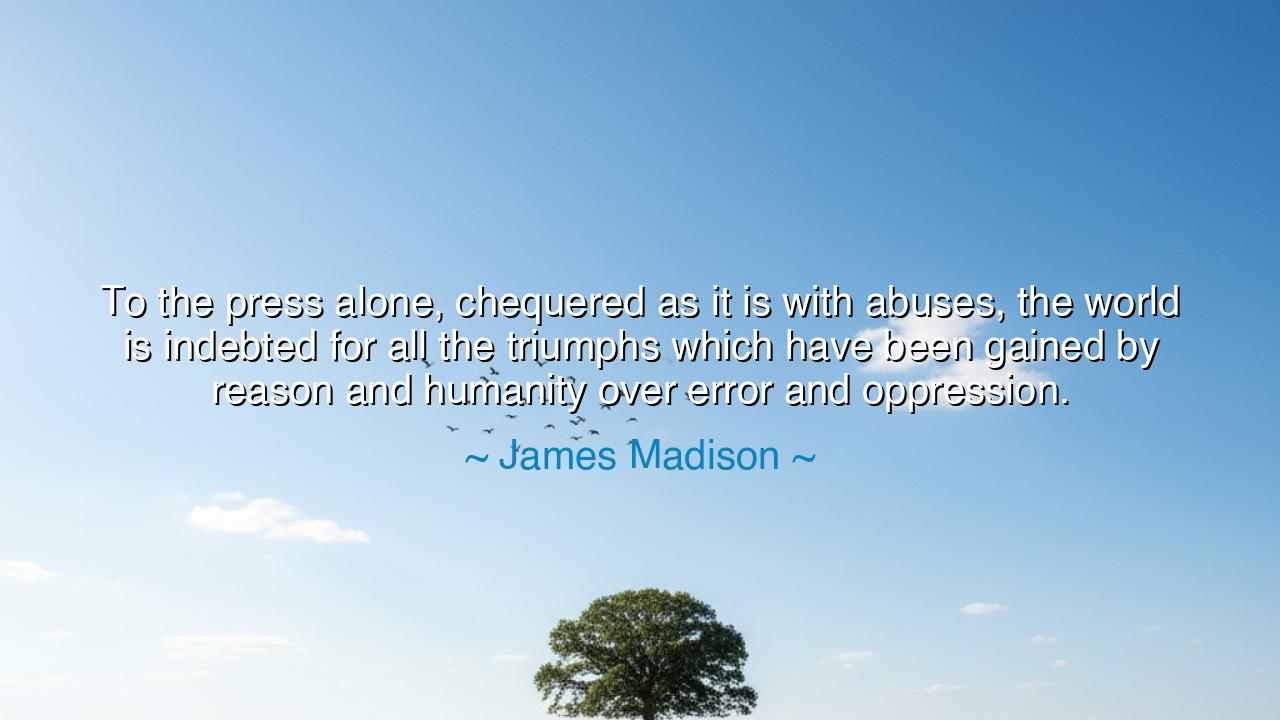
To the press alone, chequered as it is with abuses, the world is
To the press alone, chequered as it is with abuses, the world is indebted for all the triumphs which have been gained by reason and humanity over error and oppression.






When James Madison proclaimed, “To the press alone, chequered as it is with abuses, the world is indebted for all the triumphs which have been gained by reason and humanity over error and oppression,” he spoke not only as a founder of a nation, but as a prophet of freedom itself. His words arise from the fiery dawn of democracy, when the power of the written word first challenged the thrones of tyrants. Madison, the great architect of the American Constitution, understood that the press, though imperfect, was the living breath of liberty — the sacred instrument through which truth and reason could triumph over falsehood and tyranny. He knew that freedom, if it is to survive, must have a voice — and that voice is the press.
This quote was born in an age when the idea of free expression was still young and fragile. Madison had witnessed how kings silenced dissent with prisons and gallows, how truth was buried beneath decrees and dogma. In such times, even the flawed and noisy press was a weapon of light. It was through the pamphlets, newspapers, and journals of his era that revolutions were kindled — not merely revolutions of politics, but revolutions of thought. When he speaks of being “indebted” to the press, he means that human progress itself owes its victories — the victories of liberty over tyranny, of knowledge over ignorance — to the courage of those who dared to write what others feared to speak.
To the ancients, the voice of truth was sacred. The Greek philosophers called it parrhesia — the fearless speech of those who told truth to power, even at the risk of death. Madison’s vision of the press was the modern embodiment of that ancient virtue. He did not deny its flaws — he calls it “chequered with abuses,” for he knew that human hands, being imperfect, could twist even freedom into folly. Yet he understood something greater: that freedom with error is better than silence with tyranny. To silence the press because it errs is to extinguish the torch because its flame sometimes flickers.
History proves Madison’s words again and again. When William Lloyd Garrison published The Liberator in the 19th century, his voice shook the conscience of America and paved the road to the end of slavery. He was reviled, attacked, even threatened with death — yet through the power of the press, his words traveled where chains could not reach. And when the Pentagon Papers were revealed in the 20th century, exposing the hidden costs of war, the free press once more stood as the guardian of democracy against deception. These moments, like beacons through time, show what Madison foresaw: that it is through open speech and fearless writing that reason and humanity conquer oppression.
But Madison’s teaching carries both warning and wisdom. The same press that can liberate can also mislead; the same pen that writes truth can sow falsehood. Yet he reminds us that the remedy for error is not silence, but more truth, more discussion, more enlightenment. The battle between reason and oppression is eternal, and the press is its battlefield. If men and women of integrity do not write, if thinkers do not speak, then the void will be filled by lies. Therefore, the freedom of the press must be protected not because it is perfect, but because it is necessary — as the heart is necessary to life, even when it falters.
There is a moral grandeur in Madison’s vision. He saw that a nation’s strength lies not in armies or wealth, but in its courage to question. The press, he believed, is the mirror of that courage — the place where the mind of a free people is made visible. Without it, truth becomes the possession of the powerful; with it, truth becomes the inheritance of all. The tyrant fears not the sword, but the pen; not rebellion, but revelation. For revelation awakens the spirit, and once the spirit is awake, no tyranny can endure.
So, my children, take this lesson to heart: cherish the freedom of the press, even when it challenges you, even when it errs. Read deeply, question boldly, and speak truthfully, for the health of a society depends on the voices that refuse to be silenced. Be wary of those who scorn the press, for their desire is not justice, but control. And if ever the day comes when truth is no longer printed, then the light of reason will fade, and humanity will stumble once more into darkness.
Remember, then, the immortal wisdom of James Madison: “To the press alone… the world is indebted for all the triumphs which have been gained by reason and humanity over error and oppression.” These words are not mere history — they are prophecy. The press, flawed and free, is the guardian of civilization itself. Protect it, for in its survival lies the survival of truth, and in truth, the salvation of mankind.






AAdministratorAdministrator
Welcome, honored guests. Please leave a comment, we will respond soon